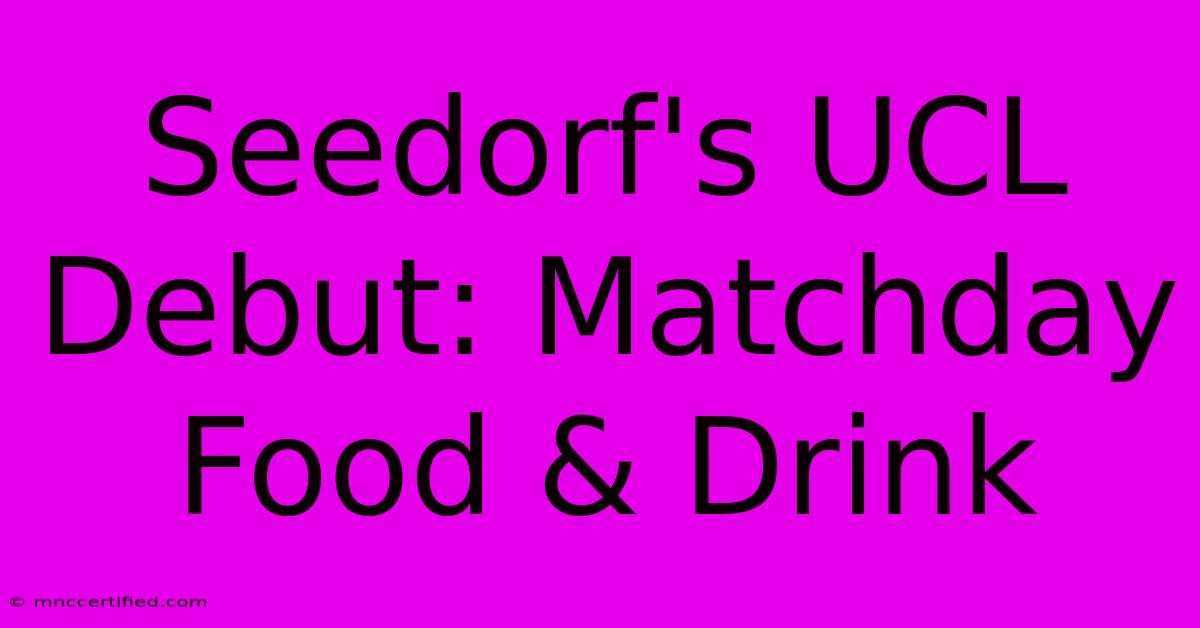Seedorf's UCL Debut: Matchday Food & Drink

Table of Contents
Seedorf's UCL Debut: Matchday Food & Drink - A Culinary Trip Down Memory Lane
Clarence Seedorf's Champions League debut is a moment etched in the minds of many football fans. But beyond the goals, tackles, and breathtaking saves, what fueled this legendary midfielder on that momentous day? While we can't definitively know his exact menu, let's explore the likely culinary landscape surrounding a high-stakes UCL matchday in the era of Seedorf's early career, focusing on the food and drink that likely powered him and his fellow players.
The Pre-Match Ritual: Fueling the Machine
For a professional athlete, especially one competing at the highest level of European football, pre-match nutrition is paramount. Seedorf, known for his incredible stamina and technical ability, would have likely followed a carefully planned diet to optimize his performance.
Carbohydrate Loading: The Foundation of Success
The cornerstone of any athlete's pre-match meal is carbohydrates. Complex carbs, like pasta, brown rice, and potatoes, provide sustained energy release, crucial for a 90-minute (or longer) battle on the pitch. Imagine a plate of hearty pasta with a light tomato sauce – a classic and effective choice for fueling muscular endurance.
Lean Protein: Building Blocks of Power
Protein is essential for muscle repair and recovery. Lean protein sources, such as chicken breast, fish, or lean red meat, would have been incorporated into Seedorf's pre-match diet. This ensures muscle function and prevents fatigue during the game. A grilled chicken salad, for instance, would offer a light yet protein-rich option.
Hydration is Key: Water, Water, Everywhere
Dehydration is the enemy of athletic performance. Access to plenty of water throughout the day leading up to the match would have been a non-negotiable for Seedorf and his teammates. Proper hydration maintains electrolyte balance and supports optimal bodily functions. Sports drinks, while potentially used, would likely have been consumed strategically to replenish electrolytes lost through sweat.
Matchday Atmosphere: Beyond the Pitch
The atmosphere surrounding a Champions League match is electrifying. The tension, excitement, and sheer adrenaline are palpable. While Seedorf's focus would have been entirely on the game, the supporting cast—teammates, coaches, and staff—likely partook in a more relaxed, yet still performance-oriented, approach to their food and drink.
The Team Meal: Camaraderie and Fuel
A pre-match team meal, likely consisting of easily digestible carbohydrates and lean protein sources, would have fostered a sense of camaraderie and team spirit. This shared experience could have served as a crucial mental preparation tool, solidifying the team's unity and focus before the big game.
Half-Time Refreshments: A Quick Replenishment
During the half-time break, players likely consumed light snacks and drinks. Simple carbohydrates, such as bananas or energy gels, combined with water or sports drinks, provide a rapid energy boost to maintain performance levels for the second half.
Seedorf's Legacy: More Than Just Goals
Clarence Seedorf's Champions League debut is a testament to his dedication, talent, and unwavering commitment to the sport. While his pre-match meals are a mystery, focusing on the nutritional needs of a high-performance athlete paints a clear picture of the fueling strategies that likely contributed to his success. His story reminds us that athletic greatness isn't just about skill on the pitch; it's about the holistic approach to training, nutrition, and mental preparation. Remember, the next time you’re cheering your team on, consider the intricate blend of dedication and meticulous planning that goes on behind the scenes.
Keywords: Clarence Seedorf, Champions League, UCL Debut, Matchday Food, Pre-match Nutrition, Football Diet, Athlete Nutrition, Carbohydrates, Protein, Hydration, Team Meal, Half-Time Refreshments, Sports Drinks, Energy Gels, Bananas
Off-Page SEO Considerations:
- Link to reputable sports nutrition articles and websites.
- Share this article on social media platforms related to football and sports.
- Engage with relevant online communities and forums discussing football nutrition.
- Guest posting on blogs related to football or sports nutrition.
This article incorporates on-page SEO by strategically using keywords throughout the text, utilizing header tags for better structure, and making it easily readable and engaging for users. The off-page suggestions will assist in building backlinks and increasing visibility.

Thank you for visiting our website wich cover about Seedorf's UCL Debut: Matchday Food & Drink. We hope the information provided has been useful to you. Feel free to contact us if you have any questions or need further assistance. See you next time and dont miss to bookmark.
Featured Posts
-
How To Get A Construction Bond
Nov 26, 2024
-
Is Composite Bonding Permanent
Nov 26, 2024
-
Clear Street Investment Banking
Nov 26, 2024
-
Sports Team Bonding Activities
Nov 26, 2024
-
Can Auto Insurance Deny A Claim
Nov 26, 2024